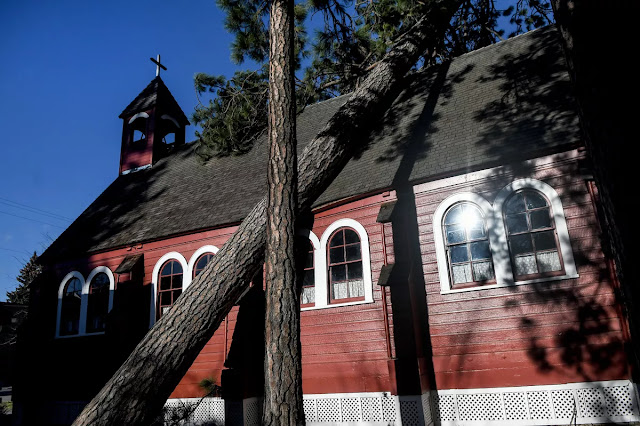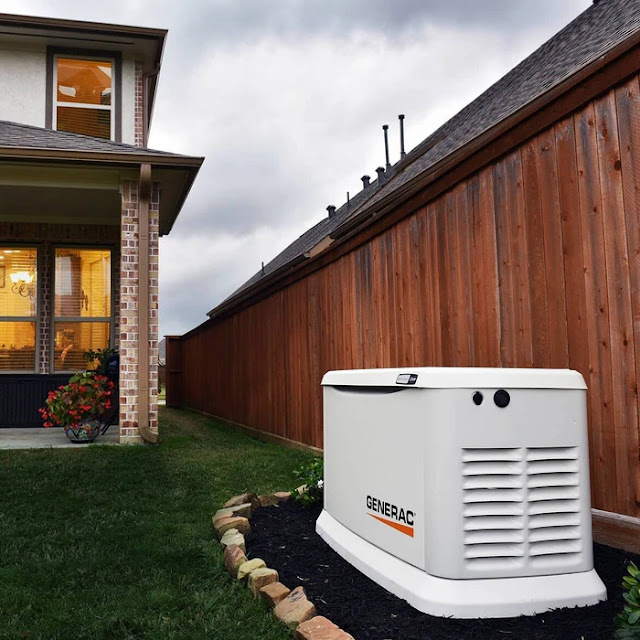"There is a time and place for diversion and amusements, but you should never allow them to override your true purpose." - Epictetus
Below: A Ponderosa pine tree fell across a street in Coeur d'Alene, ID as a result of the wind storm on January 13, 2021
The oldest church in the city suffered major damage as well. Surprisingly, it did not collapse, but it may have been pushed partially off the foundation.
There were widespread regional power outages and there was quite a bit of damage to structures. Only a couple of people lost their lives due to falling trees. It's fortunate the death toll was not higher. I've been pretty obsessive about clearing trees near the house and the shop - mainly due to fire concerns, but also due to the possibility they might hit the house. Posts about that are here and here.
Our electrical power was out for 15 hours - although of course we had no idea how long it was going to be out. Just as I did following the Labor Day wind storm, I broke out the generator after a couple of hours to power up the refrigerators. Once again, we had extension cords running all over the house, looking like a Clark Griswold Christmas lighting project.
And of course, often when this happens, the temperature outside is dangerously cold. It dropped into the mid-20's (-4 C for our metric friends) overnight, but it wasn't a lot warmer during the day. So I had to dig out the propane heater.
This little contractor heater roars like a jet engine exhaust, but it warms up the main floor of the house in minutes, and has never yet set off one of the Carbon Monoxide alarms. This time it stunk a bit more than it has in the past, and gave me a bit of a headache.
When the power is out, we can't shower, we have to use bottled drinking water, and we have to refill the toilet tanks with flush water that we've previously set aside for that purpose. Pro-tip: Use large laundry detergent and fabric softener bottles - they are thick-walled and heavy duty. The thin plastic on normal water jugs will eventually crack and leak.
Below: The noisy camp generator that must be refueled every 45 minutes when it's powering up two refrigerators. Right when you can't shower, you are refueling a wildly vibrating machine that is spraying gasoline back at you, and engulfing you in a cloud of foul-smelling exhaust fumes.
Below: The pile of extension cords that we dragged out. In addition to the refrigerators, we powered up a few table lamps, the WiFi and PC, so the kid could do her homework.
I'm getting weary of this. Who knows when the next wind or snow storm will drop hundreds of trees on hundreds of power lines? Or how long we will be without power the next time? Could it be a week? We know people in the area who have been without power for over a week.
I've been researching a solution, and came up with one that should make life a little easier the next time this happens.
The little box above contains an installed generator with a power output of 22 kilowatts. It's not enough to run every electrical load in the house, but it's enough to run the well pump, the hot water heater, and the gas furnace. With one of these, we can have a warm house and hot running water - with a few kilowatts left over for lighting, internet and miscellaneous minor electrical needs. We won't be able to bake cookies in the electric oven, but I'm fine with that.
One nice feature the machine has - it runs on propane. This means that you don't have to worry about gasoline sitting in an idle machine year after year, and finally spoiling. They can also be programmed to automatically start and run for a while once a week or once a month, to ensure they will work when needed.
There are a number of locals who went through a huge ice storm in the late 1990's, and who were without electricity for weeks. Many of them purchased whole-house gasoline-fueled generators that sat for years with no maintenance. Then the next time an outage happened, the generators didn't work. The fuel tanks, fuel lines and carburetors were gummed up with stinky old gasoline. Propane fuel eliminates this issue.
They sell these 22 KW Generac units for about $5000, and they include a transfer switch. The transfer switch takes your house off utility power and switches over to the standby generator. This transfer happens automatically when power is lost. You will have a few seconds without power while the generator starts and comes up to speed, but that's a small price to pay compared to going without power for long periods of time.
The transfer switch is also important for the safety of line workers, who can be killed if you back-feed power from your installed house generator into the distribution system. The transformer on the pole will step up voltage into thousands of volts if you feed power backward into it. Likewise when the utility re-energizes the power line, it will very likely destroy your generator if a transfer switch is not installed. If you don't have a transfer switch, you have to manually open the utility feeder breaker to avoid these scenarios.
Below: The transfer switch selects one power source or the other - but never both at the same time!!!
Sorry if I sound grumpy. I lost an entire day off due to scampering around fussing with gasoline and extension cords. That is not how I wanted to spend the day - so soon again. Heaven forbid if I had been at work when it happened - we would be tossing out all kinds of food right now.







3 comments:
When we rebuilt after the Valley Fire in 2016 we had the contractor install a 16KW Generac gen set with auto transfer switch. Runs on it's own 350 gallon propane tank. Best investment I ever made.
Will be getting another one for the Indiana house as soon as we get back their in a few months, but it will be hook up to natural gas.
Right on! Thanks for confirming it's a good idea, Eric. It's a lot of money to spend on something that *hopefully* won't be needed all that often. Glad to hear that it's a wise investment.
Suggestion though: The natural gas supply was also interrupted in Texas during this power outage for a couple of reasons: 1) Local natgas wells froze at the wellheads because the gas comes out of the ground water-saturated, and the wells weren't heat-traced or insulated. 2) Natgas compressor stations have been converted to electric-driven compressors from natgas turbine engines to reduce emissions. When large sections of the grid were dumped, the compressors were lost, so natural gas pressure was lost as well.
Maybe you'll want to have your own fuel supply... just sayin'
Yeah I hear what your saying, but the energy infrastructure in the upper midwest has a very good track record for dealing with sub-zero winter temps for a very long time. And when all else fails, just fire up the wood stove. At the moment I can get 16" split maple & oak hardwood delivered for $200 per cord. which will be the main heat source for the 30x32 shop.
Damm, I can't wait to retire in a few months. Life is good!
Post a Comment